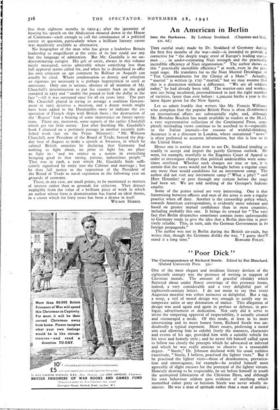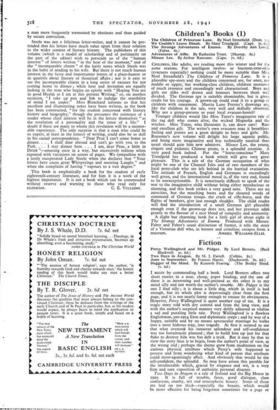" Poor Dick "
The Correspondence of Richard Steele. Edited by Rae Blanchard. (Oxford University Press. 355.1 ONE of the most elegant and insidious literary devices of the eighteenth century was the pretence of writing in support, of Christian morals. The amount of graceful' ribaldry which fluttered about under flimsy coverings of this pretence forms, indeed, a very considerable and a very delightful part of eighteenth-century letters. I do not mean to say that every Augustan moralist was either insincere or .delightful. But a tag, a wrap, a veil of moral design was enough to justify any in- temperate satire or any detonation of malice. This allegation of design was used again and again in preface or defence, in pro- logue, advertisement or dedication. Not only did it serve to invite the simpering approval of respectability, it actually created and encouraged a mode. Of this mode, at least in its more entertaining and its more honest form, Richard Steele was un- doubtedly a typical exponent. Short essays, professing a moral aim and allowing him to exhibit freely the manners, characters and events of his age, provided him with a suitable vehicle for his terse and homely style ; and he never felt himself called upon to follow too closely the precepts which he advocated or inferred and which he was really anxious to observe in a reasonable degree. " Steele," Dr. Johnson declared with his usual ruthless exactitude, " Steele I believe, practised the lighter vices." But if he practised the lighter vices—those of drunkenness, prevarica- tion and extravagance, for example—he availed himself most agreeably of slight excuses for the portrayal of the lighter virtues. Honestly desiring to be respectable, he set before himself in youth the uninspired fabrication of the Christian Hero, and although his own behaviour seldom gave evidence of anything which resembled either piety or heroism Steele was never wholly in- sincere. He was a man of aptitude rather than a man of genius ;
a man more frequently tormented by obstinate zeal than guided by secure conviction.
Steele was not a felicitous letter-writer, and it cannot be pre- tended that his letters have much value apart from their relation to the wider context of literary history. The publishers of this volume (which is a model of scholarship and of pertinacity on the part of the editor) wish to persuade us of the " human interest " of letters written " in the heat of the moment," and of the " incomparable charm " of the hasty notes which Steele was in the habit of sending to his wife. But there is not much human interest in the fussy and importunate letters of a place-hunter or in quarrels about literary or theatrical affairs ; nor is it easy to see the incomparable charm in a long series of excuses for not coming home to dinner ; while heat and invention are equally lacking in the man who begins an epistle with " Hoping You are in good Health as I am at this present Writing," or, on another occasion, " I take up pen and Ink to indulge the sensibility of mind I am under." Miss Blanchard informs us that her excellent and illuminating notes have been written, as the book has been constructed, " for the student concerned with literary history and biography," though she presumes the existence of a reader whose chief interest will be in the letters themselves " as the revelation of a personality and the tenor of a life." I doubt if there are many to whom this revelation will be a memor- able experience. The only surprise is that a man who could be so expert, at least in the joinery of writing, could also be so dull in his casual correspondence. "Dear Prue I can't come home to dinner. . . . I shall dine abroad and can't go with you to the Park. . . . I stay dinner here. . . . I am, dear Prue, a little in Drink "—amusing once in a way, but excessively tedious when repeated with variations on scores of pages. We sympathise with a justly exasperated Lady Steele when she declares that " Your letters here cause great Whisperings and sneering Laughs " and when she complains of having " vapours to a vast degree."
This book is emphatically a book 'for the student of early eighteenth-century literature, and for him it is a work of the highest importance. It is not a book which can be commended without reserve and warning to those who read only for



























 Previous page
Previous page